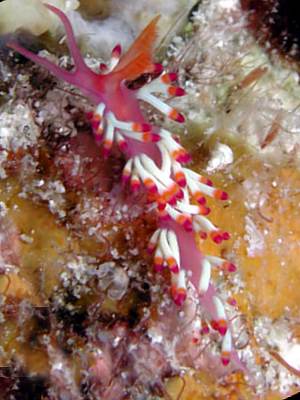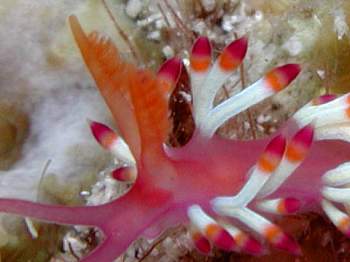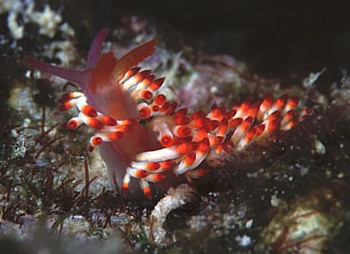
Flabellina delicata
Gosliner & Willan, 1991
Order: NUDIBRANCHIA
Suborder: AEOLIDINA
Family: Flabellinidae
DISTRIBUTION
Indo-West Pacific [Natal, South Africa; Papua New Guinea; Okinawa, Japan]
PHOTO
Zamami Island, Okinawa Island group, Japan. 26 May, 2002; Length: 20mm. Depth: 20m. Photo: Nishina Masayoshi
One of a group of species of Flabellina with papillae on the posterior side of the rhinophores. The background color of the body is a translucent pinkish red or purple, deeper in some animals than others. The oral tentacles are the same colour with a reddish colour at the tips. The rhinophores are a translucent orange or red, the colour deepening in the papillate part of the rhinophores. The basal two-thirds of the cerata are either translucent white or dusted with white, and the duct of the digestive gland is opaque white. There is sometimes a distinctive opaque whitish band around the cerata at the upper edge of the white region of each ceras. Above the white band there is another translucent region, then a band of golden-yellow or orange. This yellow/orange region seems to be caused by the swollen tip of the digestive gland duct rather than epithelial pigmentation on the ceratal wall. Above this there is a subapical transverse ring of dark translucent purple. The ceratal tip is translucent white. The rhinophores are elongate and slender with approximately 30 well-separated papillae on their posterior surface. The living animals are 15-20mm in length.
References:
• Gosliner, T. (1987) i>Nudibranchs of Southern Africa. A Guide to the Opisthobranch Molluscs of Southern Africa. Sea Challengers / Jeff Hamann: Tokyo. 136pp.
• Gosliner, T.M. & Willan, R.C. (1991) Review of the Flabellinidae (Nudibranchia: Aeolidacea) from the tropical Indo-Pacific, with the descriptions of five new species. The Veliger, 34(2): 97-133.
Rudman, W.B., 2003 (March 16) Flabellina delicata Gosliner & Willan, 1991. [In] Sea Slug Forum. Australian Museum, Sydney. Available from http://www.seaslugforum.net/find/flabdeli
Related messages
Re: Flabellina delicata's rhinophore
March 19, 2003
From: Nishina Masayoshi

Dear Bill,
Following your comments, I have attached a close-up of the rhinophore of my animal. I hope this will be help.
Best Regards,
Nishina Masayoshi
nishina@wips.co.jp
Thanks Nishina,
We can clearly see the papillate rhinophores now.
best wishes,
Bill Rudman
Re: Aeolid from Japan
March 18, 2003
From: Nishina Masayoshi

Dear Bill,
The recent posting by Hikaru Nakada is probably Flabellina delicata Gosliner & Willan, 1991.
Location: Zamami Island, Okinawa Island group, Japan.
Date: 26 May, 2002
Length: 20mm
depth: 20m
water temp: 25C degree
Best Regards,
Nishina Masayoshi
nishina@wips.co.jp
Masayoshi, N., 2003 (Mar 18) Re: Aeolid from Japan. [Message in] Sea Slug Forum. Australian Museum, Sydney. Available from http://www.seaslugforum.net/find/9428Dear Nishina,
Thanks for the identification and the photo. Terry Gosliner has also reminded me of this species.
Best wishes,
Bill Rudman
Re: Aeolid from Japan
March 18, 2003
From: Terry Gosliner
Hi Bill,
The recent posting by Hikaru Nakada sure looks like Flabellina delicata that I described with Richard Willan.
Terry
Thanks Terry,
Now I remember where I saw it - in your South African book. The photo in Gosliner & Willan (1991) is of a paler colour form, and I'm afraid I couldn't see the papillate rhinophores in Hikaru's photo. Things get lost forever on the unidentified pages so its great to be able to give this species 'a home' after only one day.
Atsushi Ono's photo, on Bob Bolland's website, shows a colour form from Kerama Id, in which the rhinophoral papillae can be seen very clearly.
Cheers,
Bill Rudman
Aeolid from Japan
March 17, 2003
From: Hikaru Nakada

Hello Bill,
Can you help me identify this species for me please.
Locality: Okinawa Is. Japan
Divesite: "Seragaki Beach"
Size: 20mm
Depth: 3m,
Date: Jan. 2003.
Hikaru Nakada
divernk@m1.cosmos.ne.jp
Nakada, H., 2003 (Mar 17) Aeolid from Japan. [Message in] Sea Slug Forum. Australian Museum, Sydney. Available from http://www.seaslugforum.net/find/9361Dear Hikaru,
I have the feeling that I have seen this aeolid somewhere, but I can't find a name for it. If anyone can help us, I would be most grateful.
Best wishes,
Bill Rudman
